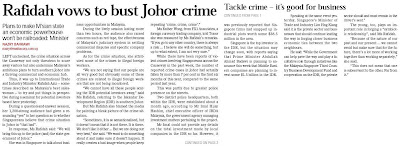An interview with Lee Kuan Yew - 24 August 2007.
I've always enjoyed listening to speeches and reading the comments of Lee Kuan Yew. The words are sharp & direct and the viewpoints insightful & opinionated. Much like our very own Tun Mahathir 'Apa Nama' Mohd.
Here, he talks about what he knows best... reality. The reality of Singapore, the Asian behemoths China & India, ASEAN, nation building and the future.
Excerpts from an interview with Lee Kuan YewHere are some choicy bits which I particularly liked:
Published: August 29, 2007 on IHT.com
The following are excerpts from an interview with Lee Kuan Yew, who served as prime minister of Singapore from 1959, when it gained partial independence from Britain, until he stepped down in 1990. He is currently minister mentor.
The interview took place at the Istana, where the Singapore president and prime minister work, on Aug. 24, 2007. Lee was questioned by Leonard M. Apcar, deputy managing editor of the International Herald Tribune, Wayne Arnold, a Singapore correspondent, and Seth Mydans, Southeast Asia bureau chief.
On Singapore and nation building...
Lee Kuan Yew: Because we thought by joining Malaysia, we'd go back to the old Singapore. We would have a hinterland, a common market, and can develop import substitution industries like other countries. Now, we're off on our own with not the most sympathetic of neighbors. How do we live?On China...
To begin with we don't have the ingredients of a nation, the elementary factors, a homogenous population, common language, common culture and common destiny.
We are migrants from southern China, southern India, Pakistan, Bangladesh, before it was divided, Ceylon and the archipelago. So, the problem was, can we keep these peoples together?
The basis of a nation just was not there. But the advantage we had was that we became independent late. In 1965, we had 20 years of examples of failed states. So, we knew what to avoid - racial conflict, linguistic strife, religious conflict. We saw Ceylon.
Thereafter, we knew that if we embarked on any of these romantic ideas, to revive a mythical past of greatness and culture, we'd be damned. So, there's no return to nativism. We have left our moorings. We're all stranded here to make a better or worse living than in our own original countries.
IHT: To what extent can you replicate the Singapore model in other countries? Does it work?
Lee Kuan Yew: Supposing we had oil and gas, do you think I could get the people to do this? No. If I had oil and gas I'd have a different people, with different motivations and expectations. It's because we don't have oil and gas and they know that we don't have, and they know that this progress comes from their efforts. So please do it and do it well.
We are ideology-free. What would make the place work, let's do it.
IHT: We've written a lot about the competition for jobs and foreign investments. When it comes to China, it's obviously a great opportunity. But what other pressures do you see emanating from China for the rest of Asia?On China & India, and the future of Asia:
Lee Kuan Yew: The next 10, 15 years, China is more an opportunity than a challenge. In the next 15, 20, 30 years, the opportunities will be taken up by many other competitors in China. The challenge will come when they start exporting not just low-end products but intermediate products and even some high-end products and software. And they will begin to export their expertise, exporting their factories and plants.
IHT: What about politically? There's always this talk of China seeing itself as the Middle Kingdom still. Does China have long-term ambitions in Asia that cause concern to the rest of the region?
Lee Kuan Yew: Well, there are memories, not institutionalized but in folk memories at a popular level. For instance when the Sultan of Brunei went to Beijing, about 10 years ago. They took him to his great-great-grandfather's mausoleum in Nanjing where he had died, when bringing tribute to China.
It was a neat way of reminding the Bruneians and the rest of us - Brunei was then a big empire in West Borneo - that this was our place in the pecking order.
[sean-the-man's note: If the Sultan of Brunei had to travel to China to pay tribute, would the Emperor of China marry off his daughter to Malacca, to a similar or lesser Sultan?... Food for thought, no?]
Lee Kuan Yew: If you study the history of this region, you will see that two influences came from the north. One was India from the west; the other was China from the east. So you have the Ramayana Classics, the dances and music in Burma, Thailand, Cambodia, Malaysia, Indonesia. You have Borobudur and Hindu-like temples in Bali. Then in the east you have Vietnam, and then the seaports of the region, pockets of Chinese traders.On the environment...
So historically, two forces were at work, two higher civilizations India and China from the north flowed into this region.
Then European colonialism took over for 200 years.
Now, China and India have revived. I believe the outward thrust of their influence will follow a similar pattern.
Lee Kuan Yew: I think the problems will become more acute the other way, overpopulation, earth warming and displacement of millions, maybe billions of people, that is the greater danger.I wouldn't call the man a savant or an oracle, but he has a nasty habit of being right and rubbing your nose in it.
IHT: What about the risks to Singapore, what are the risks to Singapore in those scenarios?
Lee Kuan Yew: Oh! We are already in consultations with Delft in Holland to learn how we can build dikes!
IHT: Is that right?
Lee Kuan Yew: Oh, yes! Let's start thinking about it now.
IHT: Are you serious?
Lee Kuan Yew: We are. We are in consultations with them.
It scares me because many world leaders have not woken up to the peril that their populations are in.
This melting ice cap. I expected great consternation! What would happen to this earth? But, no. Has it triggered off emergency meetings to do something about this?
Earth warming, the glaciers melting away? Never mind the Swiss Alps and skiing resorts having to manufacture snow. When the glaciers in the Himalayas and Tibet melt away, the Ganges, the Yangtze, the Irrawaddy, the Mekong, may dry up, except for rainy seasons. What will happen to the hundreds of millions? Where do they go? Where can they go? This will be a very serious problem.
IHT: Why don't you think the world isn't focusing on this?
Lee Kuan Yew: Because it's not an election issue. You know maybe 50 years, a 100 years, most of us would be dead. Leave it to the next president.
IHT: That's human nature isn't it? But it doesn't seem to be the way Singapore operates.
Malaysian politicians would do well to recognise some of the imminent issues and dangers that he brings up. They should be concentrating on building the damn dykes now (against external threats), instead of spending all their time dicking around with internal fetishes the country can ill-afford - like ketuanan Melayu, Islamic states and the NEP.




























































